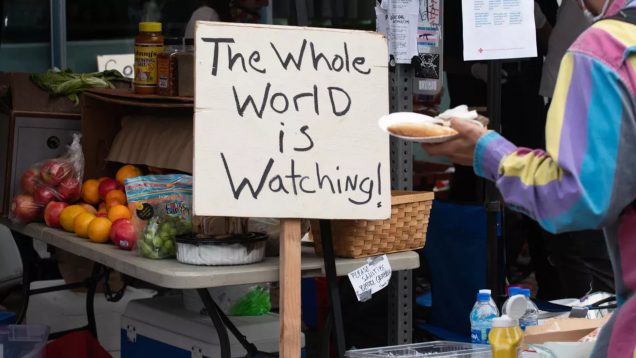Course Spotlight: U.S. Food Policy and Cultural Politics


In response to the food-system challenges of pandemic and structural violence, Dr. Ellen Messer has been revising MET ML 721, “US Food Policy and Cultural Politics” to integrate themes from our cutting edge conversations. New formats and materials include integration of new readings and Zoom recordings on food-security issues associated with pandemic and racial disparities, new films and videos associated with struggles for land and food rights in different US locations, podcasts featuring the voices of new community leaders of color, and strengthened sections on gardening and labor issues.
We invite you to read the updated course description:
This course overviews the forces shaping U.S. food and nutrition policies, diets, and cultural politics in the twenty-first century. Special emphases in 2020 include critical responses to the COVID-19 pandemic and nation-wide demands for an end to all forms of racial and ethnic violence and injustice. Course resources and discussions cover the history of U.S. domestic food policy, the Farm Bill, “self-reliance” versus “comparative advantage,” and “sustainability/resilience” versus “efficiency,” and rights-based vs needs-based approaches as drivers of American agricultural, dietary, and food-regulatory policies. All topics and sessions integrate consideration of the multiple ways nutrition policies intersect with health disparities associated with systemic racism, inequalities, and violence. Using Greater Boston as a reference case in point, these discussions critically examine how 2020 nutrition-policy efforts by civil society and government align goals and actions to move forward from hunger to health, and use an “equity lens” to link short-term thinking with longer term outcomes. Concluding sessions probe responses to the question, “Is there a human right to food in the United States?”– what additional actions are required?
“Food systems,” “food chains,” and “dietary structure” provide major analytical frameworks for tracing how food moves from farm to table, and the role of local through national government and private for-profit and non-profit non-government institutions in managing these food flows. Within each and considering the food system as a whole, course materials and discussions examine structural violence and persistent inequalities, and the ways policy, practice, and performance mitigate or exacerbate nutritional differences and enlarge or restrict the many voices of those impacted.
Class projects throughout the term explore how the current context affects particular food categories and food value chains, and the ways institutions are developing new strategies and tactics to address recent challenges. Assigned readings about regional food-sheds will draw on Northeast and
New England case studies, but participants joining from a distance will be able to contribute comparative information and experiences from their home locations, where comparable multi-sectoral “food security” and “sustainable food systems” initiatives intersect with “globalization from below.” These policy discussions constructively analyze the multiple layers of regulations and policies, and civil-society organizations and networks, which shape U.S. food systems and food chains at federal, state, municipal, and community levels. They highlight the significance of policy, practice, and performance that influence the varying outcomes and impacts of federal programs at state and local levels.
Objectives:
- Learn the basic structures, operations, and functions of U.S. federal, state, and local food agencies; their connections to non-government food agencies; and the ways these organizations manage official and parallel (supplementary) food systems, more or less effectively, to ensure everyone in the U.S., without discrimination, has access to nutritionally adequate food.
- Engage the challenges of preventing overweight, obesity, and associated chronic disease in the US food and policy context, including challenges to de-link ethnic, racial, and economic disparities from adverse nutritional-health outcomes.
- Be able to use USDA and FDA web-based information platforms for commodity policy analysis and advocacy, and critique associated structural inequalities associated with farm and nutrition programs.
- Understand sustainable food systems models, methods, and materials, as these motivate food-policy councils’ analysis, strategies, and actions; and recent efforts to include more diverse community voices in these processes.
MET ML 721 A1, US Food Policy Cultural Politics will meet on Tuesday evenings, from 6 to 8:45 PM, starting on September 8th in on campus/Learn from Anywhere format. The course is open to graduate students and advanced undergraduates. Non-degree students may also register. Please contact gastrmla@bu.edu for more information.